Resitting a GCSE can feel difficultf, but it’s also an opportunity to improve your grades and open up new academic or career pathways. Whether you missed the required pass grade or simply want to boost your score, this guide will explain when GCSE resits take place in 2025, how to enter, what costs to expect, and how to prepare effectively. It draws on the most recent information from exam boards, education experts, and official guidance.
Update Alert: With reform in motion, resit arrangements may shift. Read our GCSE Reform & Exam Changes 2025-27 guide to understand how formula sheets, assessment changes, and resit policies are evolving.
JUMP TO SECTION
When Can Students Retake GCSE Exams?
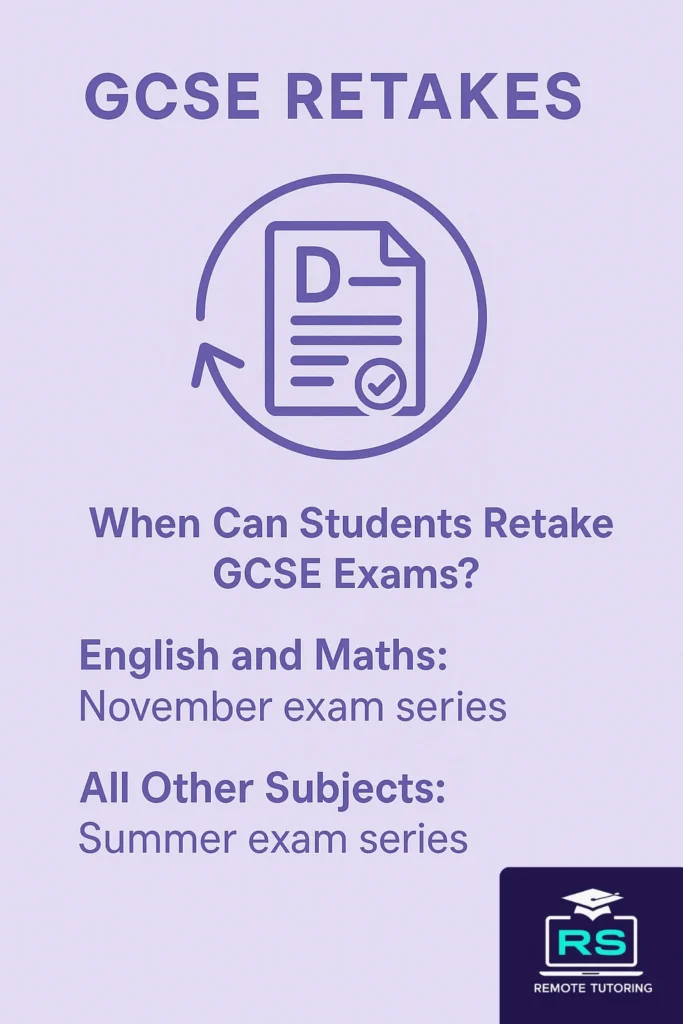
Once you have received your GCSE results in August 2025, you might be considering a resit, especially if you did not achieve the grade you needed. In the UK, resit opportunities differ by subject:
- English and Maths: Students can resit these compulsory core subjects in the November exam series. According to a recent article by Tes, students can retake English language and maths GCSEs in November. This autumn series is primarily designed for those who did not achieve the required grade 4 standard pass (or simply want to improve their grade).
- All Other Subjects: Subjects such as Science, History, Geography and Modern Languages must wait for the next summer exam series (May to June 2026). As the same Tes report notes, “students will have to wait for the next summer series in 2026”.
- Private Candidates and International Students: If you studied independently or sat International GCSEs, please check directly with your exam centre, as dates may differ by board and location.
Key GCSE Resit Dates & Deadlines (2025/26)
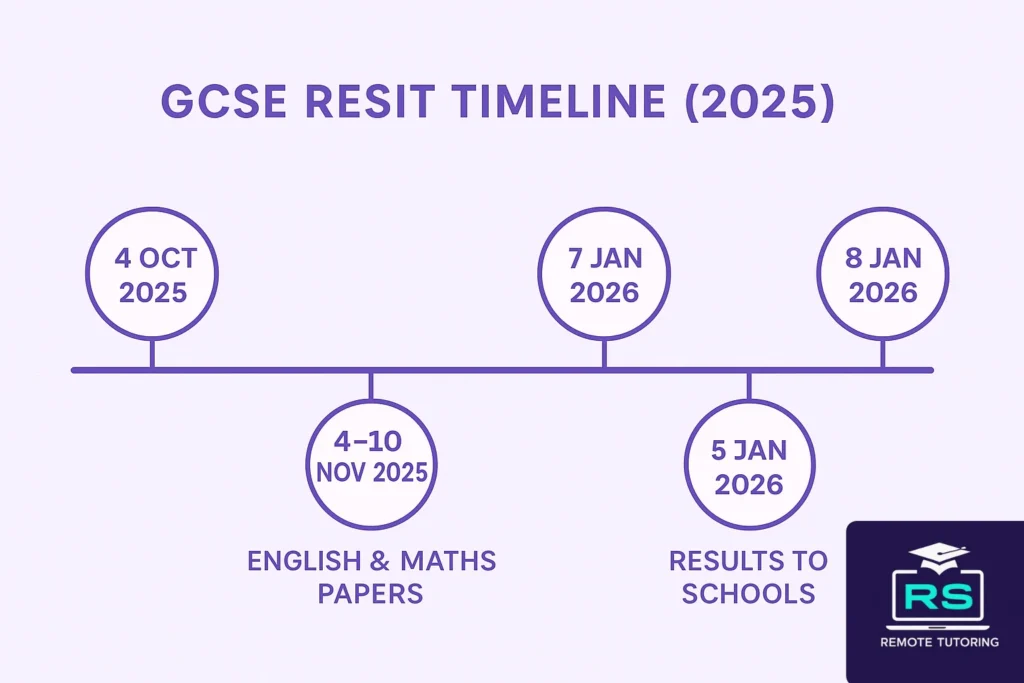
Knowing the deadlines and exam dates ensures you don’t miss your chance to register.
| Resits Date | Events and Subjects |
|---|---|
| 4 October 2025 (Saturday) | Entry deadline for GCSE resits. Late entries may incur additional fees. |
| 5 November 2025 (Wednesday) | Deadline to submit English Language spoken‑language endorsement grades. |
| 4 November 2025 (Tuesday) | English Language Paper 1 |
| 5 November 2025 (Wednesday) | Mathematics Paper 1 |
| 6 November 2025 (Thursday) | English Language Paper 2 |
| Friday 7 November 2025 (Friday) | Mathematics Paper |
| Monday 10 November 2025 (Monday) | Mathematics Paper 3 |
| 7 January 2026 (Wednesday) | Results released to schools and colleges. |
| 8 January 2026 (Thursday) | Results released to students. |
Subject specific dates for Maths resits
A subject‑specific example from The Exam Tutor shows that major exam boards schedule maths resit papers across three sessions in early November.
- Edexcel: Wednesday 5 November, Friday 7 November, Monday 10 November
- AQA: Thursday 6 November, Friday 7 November, Monday 10 November
While these are provisional, they illustrate the typical timetable. Always check your own board (AQA, Edexcel, OCR, WJEC) for the final dates.
Who Has to Resit English and Maths GCSE?
Achieve at least Grade 4 (standard pass) in English and Maths is government expectation. Tes explains students who do not attain a Grade 4 standard pass in these subjects “will need to resit”. Students who choose to retake to improve a grade must pay the exam fee; however, those required to resit because they didn’t meet the Grade 4 threshold typically aren’t charged.
How to Book a GCSE Resit
Booking a resit involves several steps:
- Decide Which Exam Board: You need to select the same exam board as your original exam or choose a new one (AQA, Edexcel/Pearson, OCR, WJEC). Private candidates should check which boards local centres offer.
- Register Before the Deadline: Use the entry deadline above (4 Oct 2025). Schools usually handle registrations for their students. Private candidates must contact an exam centre and complete entry forms by the published cut‑off.
- Pay the Exam Fee: Costs vary by board and subject. An example exam fee table from Exam Centre London lists AQA GCSE subjects costing around £215 to £305, with additional charges for late entries. Some combined science qualifications cost more (around £390). Private candidates may also pay an admin fee.
- Choose a Centre: If you’re no longer at school, you need to find a centre that accepts private candidates. Many FE colleges and independent centres offer this service.
- Prepare Documentation: Ensure you have your candidate number (UCI/ULN), proof of identity and any special consideration forms.
How Much Do GCSE Resits Cost?
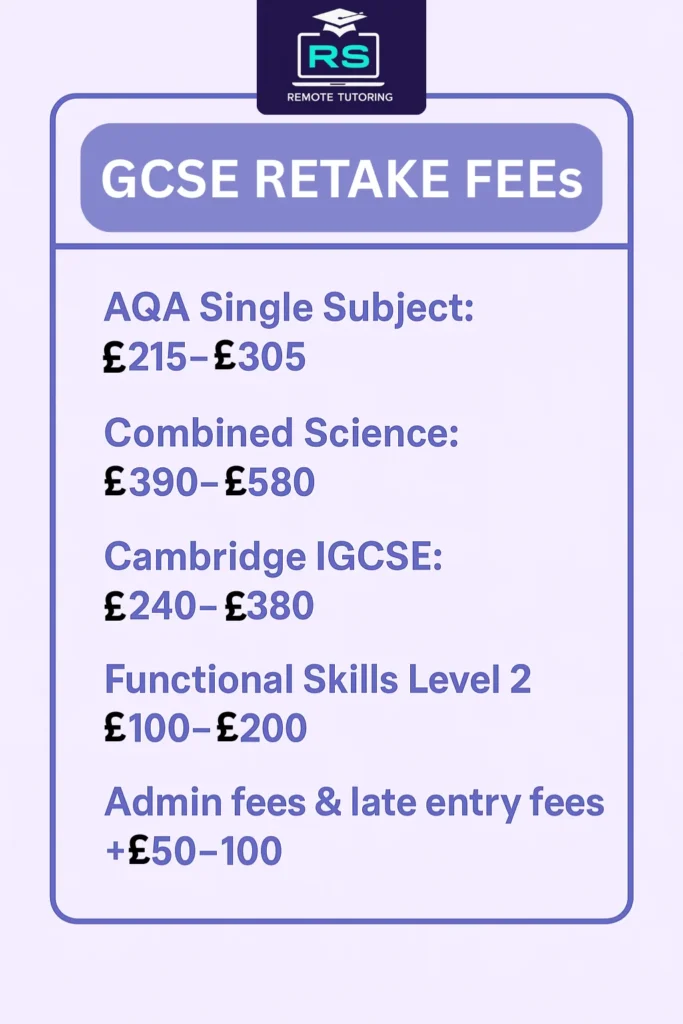
Costs vary widely depending on the subject, exam board and whether you enter on time. To give you a sense of scale:
- AQA single subjects (e.g., History, Biology, Chemistry): around £215, rising to £300 to £380 with late fees.
- Combined Science: £390 (standard) up to £580 (late).
- Cambridge IGCSE subjects: £240 to £380.
- Private candidate fees at some centres start around £100 to £200 per subject, but can be higher. Many schools charge an administration fee to cover costs.
- Functional Skills Level 2 exams (GCSE equivalent) are often cheaper and include results within 10 working days.
Always ask your chosen centre for a full breakdown of fees to avoid surprise costs.
Understand GCSE Grade Boundaries for Resits
Grade boundaries are the minimum marks needed to achieve each grade. These boundaries are set after papers are marked and can differ slightly between summer exams and November resits. Tes explains that during the summer, boundaries are partly informed by Key Stage 2 data (predicting cohort performance). For the smaller November resit cohort, examiners instead compare papers against the previous summer series. This adjustment ensures it’s “no easier or harder to achieve a particular grade in any particular exam series”.
Key terms:
- Standard pass: Grade 4 (roughly equivalent to a C).
- Strong pass: Grade 5.
- Good pass: Sometimes used to refer to Grade 5 or higher.
You never lose your original grade: if your resit grade is lower, you can still use the higher result.
How to Prepare for Your GCSE Resit
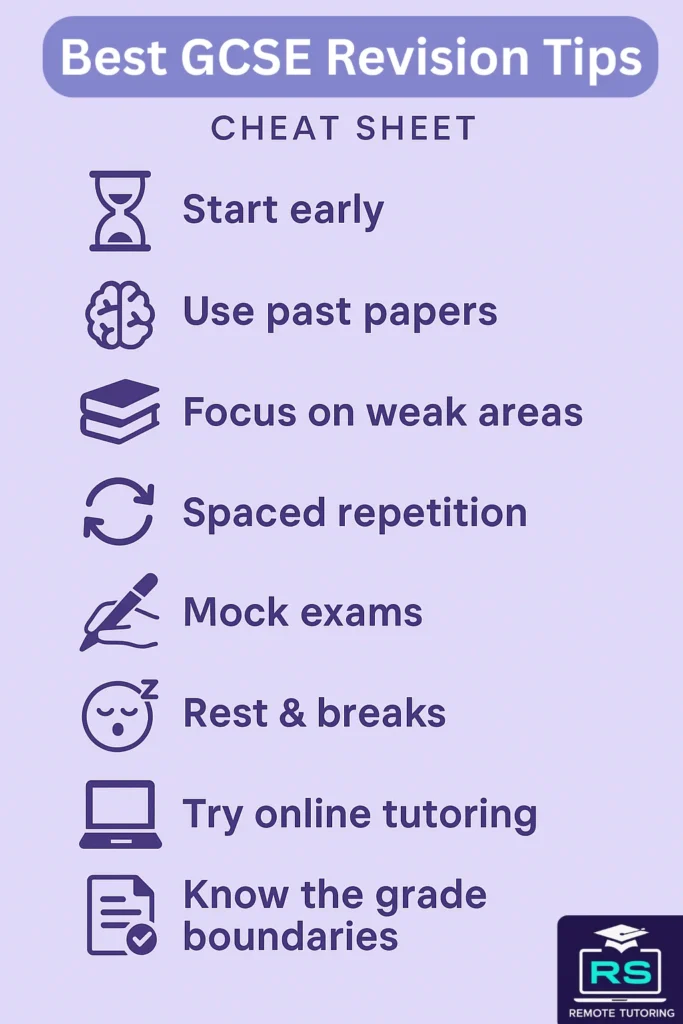
The best way to approach your resit is with a structured plan. Drawing on advice from revision experts and exam tutors, here are proven strategies:
- Start Early & Plan: As soon as you decide to resit, create a revision timetable. Spread revision over weeks, focusing on your weakest areas first.
- Use Past Papers: Practising past papers will help you become familiar with exam format, refine your timing and understand mark schemes. The Exam Tutor emphasises practising past papers and using spaced repetition.
- Break Down Difficult Topics: Use mind maps, diagrams, and summarise notes to simplify complex concepts. Teaching the topic to someone else also reinforces your understanding.
- Get Feedback: Mark your practice papers or ask a teacher/tutor to do it. Focus on the mistakes you repeat and learn how to improve.
- Plan for Personal Wellbeing: Revision works best when you’re well-rested. The Exam Tutor reminds students to eat well, sleep enough and take regular breaks.
- Consider Online Courses or Tutoring: Online platforms offer structured resit courses with videos, quizzes and progress tracking. One‑to‑one tutoring provides personalised feedback and targeted support, especially for tricky topics.
- Sit Mock Exams: Simulate exam conditions to build confidence.
Preparing for Maths or English Specifically
Maths and English are the most common resits, so tailor your plan:
- Maths: Focus on key topic areas (algebra, geometry, statistics). Use formula sheets and practise mental arithmetic.
- English: Practise reading comprehension, essay structure and timed writing. For English Language, refine skills like summarising and critical analysis.
What Happens After GCSE Resit?
You’ll receive a provisional statement of results early in January 2026. Official certificates arrive later in the spring term.
If your grade still doesn’t meet requirements:
- Appeal or Request a Review: You can ask your school or exam centre to submit a clerical check or full remark.
- Resit Again: There is no limit to the number of times you can take a GCSE.
- Check Alternatives: Consider Functional Skills Level 2 qualifications in Maths or English. These are accepted by universities and employers, can be taken online from home, and have faster results (within 10 days).
- Vocational Courses: Some vocational pathways (such as NVQs or apprenticeships) accept functional skills instead of GCSEs.
Remember: if you resit and achieve a lower grade, you keep the higher grade.
Alternatives to GCSE Resits: Functional Skills & Equivalency Exams
Functional Skills Level 2 in English and Maths are widely recognised as GCSE equivalents. They are:
- Online and Flexible: Exam boards can offer them “on demand,” meaning there’s no fixed date and you can sit them when you feel ready.
- Accepted by Universities and Employers: AQA and Pearson Edexcel offer these qualifications.
- Shorter and More Focused: The content is generally narrower than GCSEs, making it faster to prepare.
There are also GCSE equivalency exams, which are shorter composite exams and may offer faster turnaround times, as little as two working days for result. These are particularly useful for teacher training programmes and adult learners.
GCSE Resit FAQs
Below are some quick‑fire answers to common questions:
When are GCSE resits in 2025?
English and Maths resits take place in November 2025, with paper dates from 4–10 November. Other subjects are in summer 2026.
What is the entry deadline?
The entry deadline for the November 2025 resit series is 4 October 2025.
Do I have to pay for a resit?
Students required to resit because they did not meet grade 4 generally don’t pay. Voluntary resits or other subjects incur fees that vary by board and centre.
How many times can I resit?
There is no limit on the number of resits you can take.
Are grade boundaries lower or higher for resits?
The method for setting grade boundaries in the autumn series differs but aims to ensure fairness.
Can I resit as a private candidate?
Yes. Contact an approved exam centre and pay the appropriate fees.
What if I forget my candidate number or UCI?
Your school or exam centre can retrieve these details; ensure you check ahead of time.
Is Functional Skills Level 2 accepted instead of GCSE?
Yes. National Careers Service guidance confirms that if you don’t achieve a grade 4, you may be eligible to take Functional Skills qualifications.
Final Thoughts
Resitting a GCSE may feel like a setback, but it’s actually a second chance to solidify your skills and improve your future prospects. By understanding the key dates, entry rules, costs, grade boundaries, and preparation strategies, you can approach your resit with confidence and a clear plan.
At RS Remote Tutoring, our qualified UK tutors specialise in helping students prepare for GCSE resits. We offer:
- Targeted revision sessions for Maths, English, and other subjects
- Flexible online lessons tailored to your learning style
- Support with exam entry and grade boundary understanding
Whether you’re aiming for a first‑time pass or chasing a higher grade, we’re here to help you succeed. Book a free consultation today to start your resit journey with expert support.
Disclaimer: The guide is based on publicly available information from UK exam boards, government education portals, and expert sources as of August 2025.

Raja specializes in Physics and Maths, with over 5 years of experience. He offers KS2, KS3, and GCSE Science and Maths lessons. He graduated from one of the top universities in the UK.

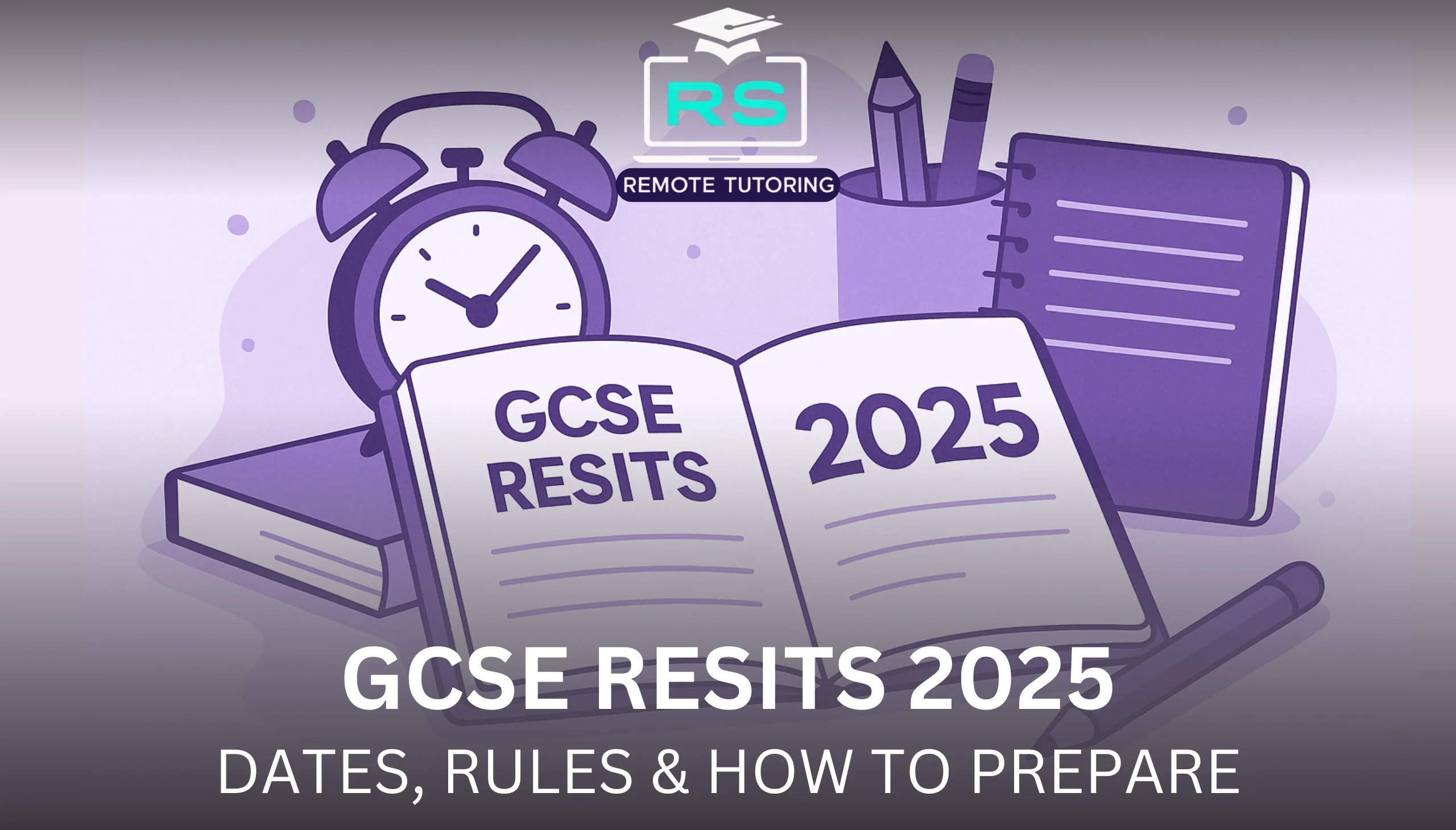
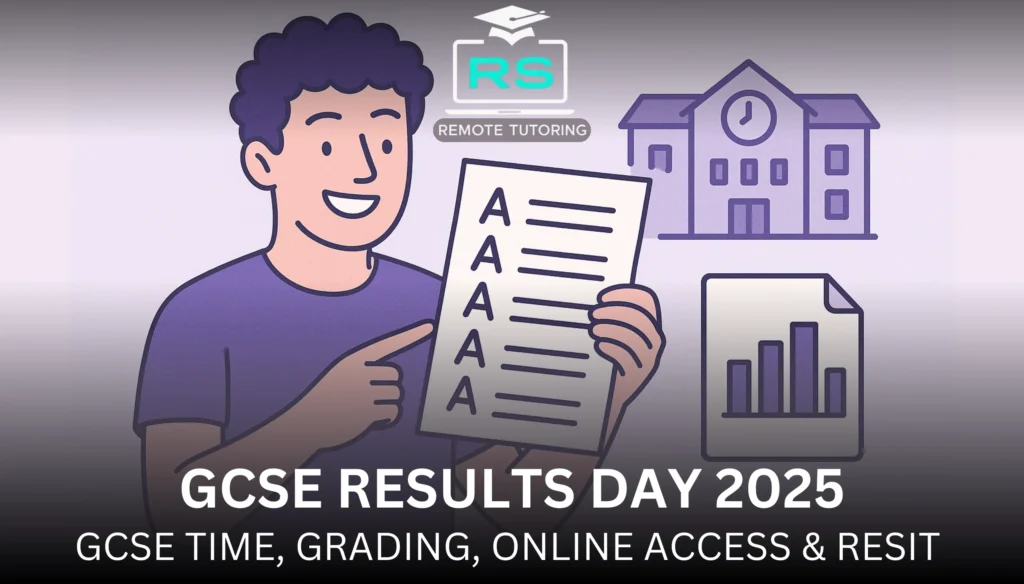
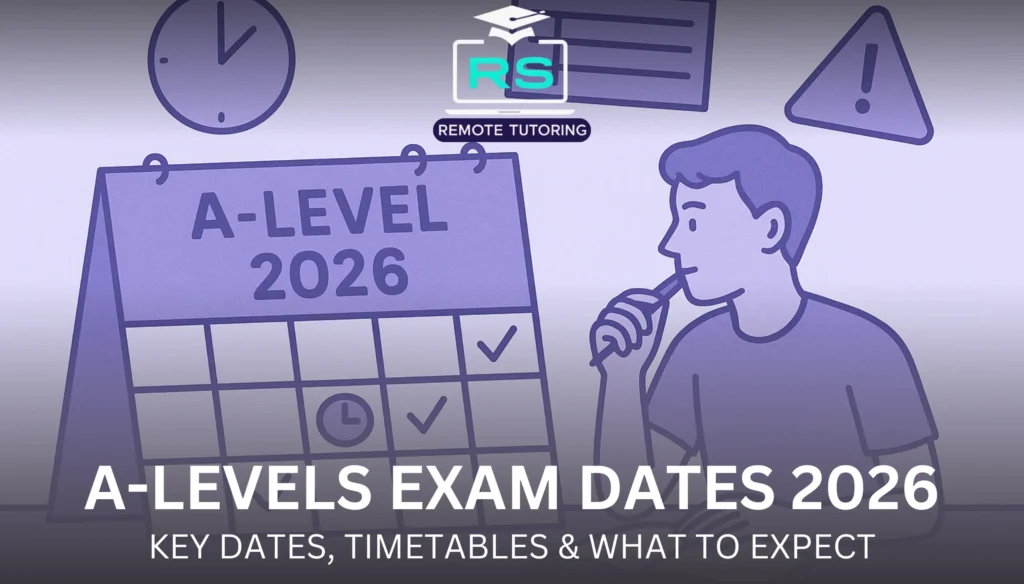
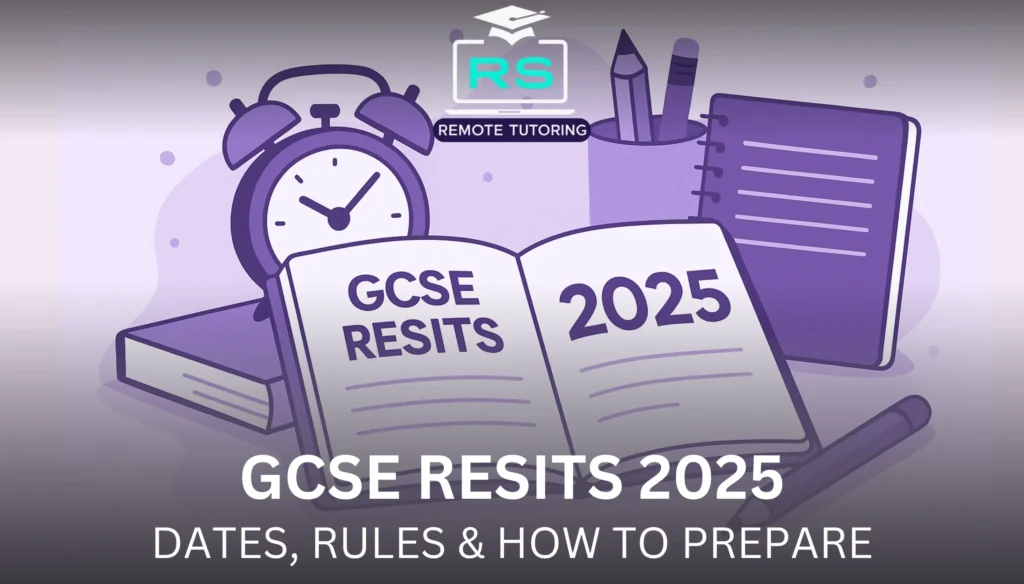
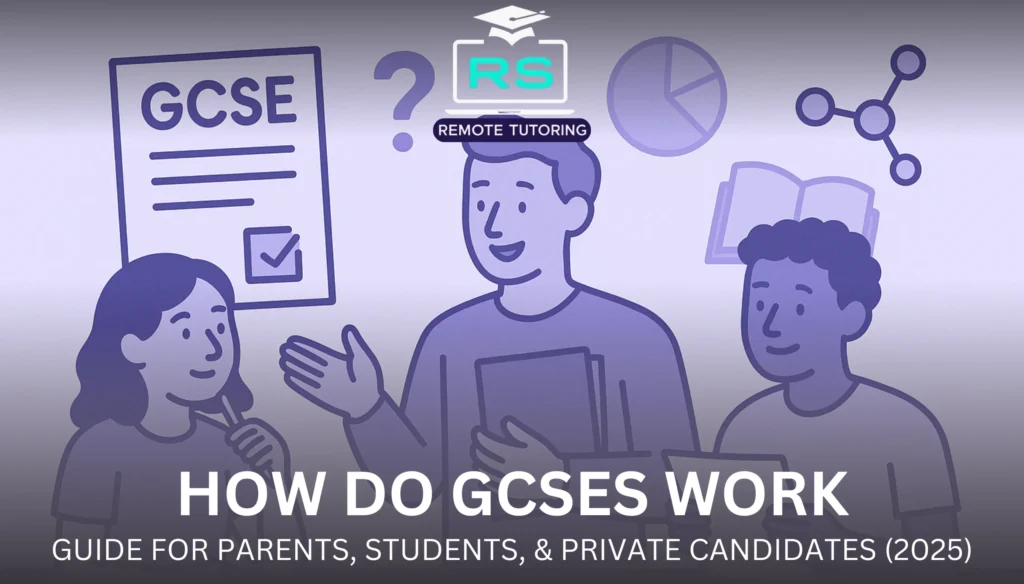
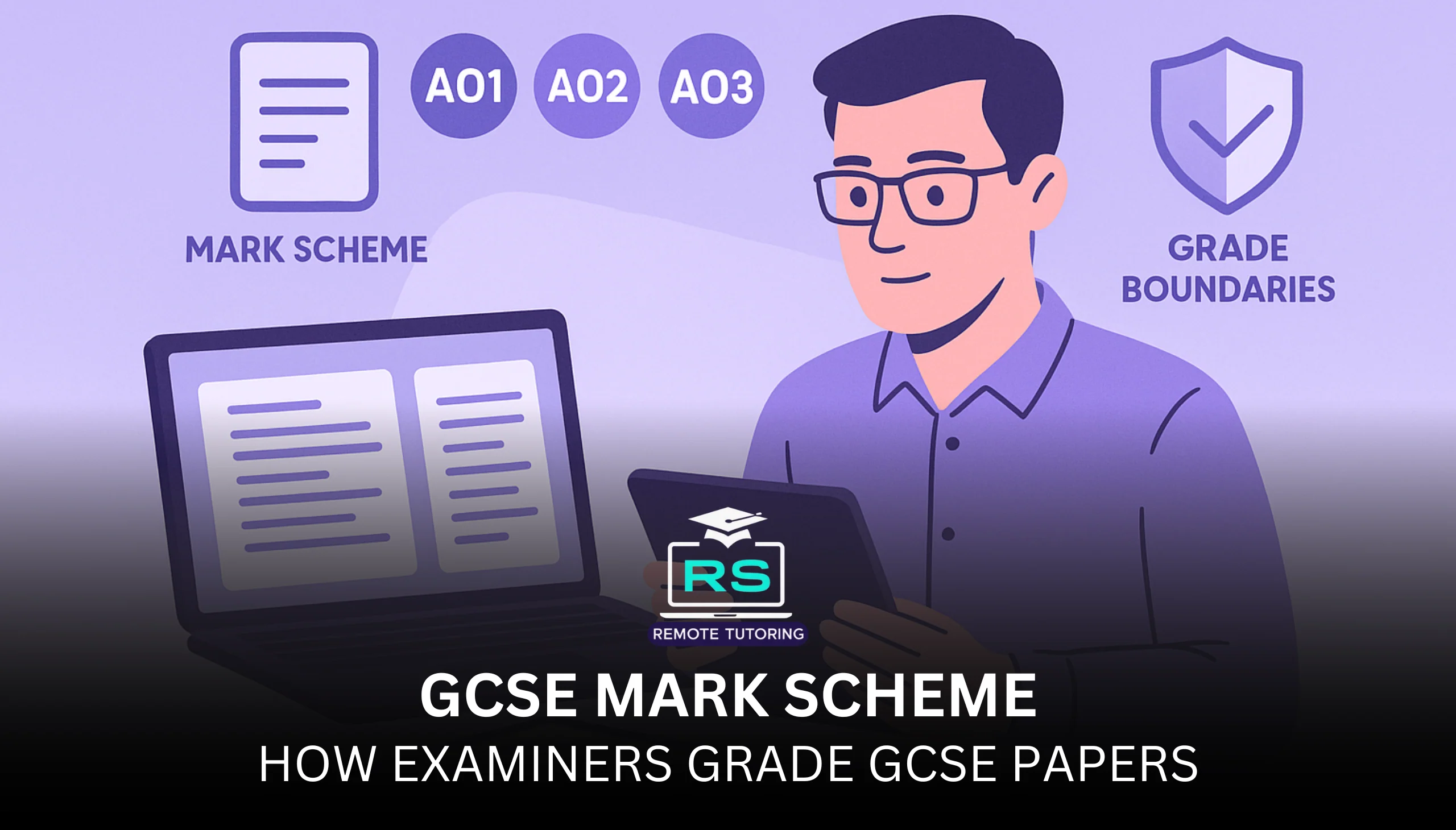
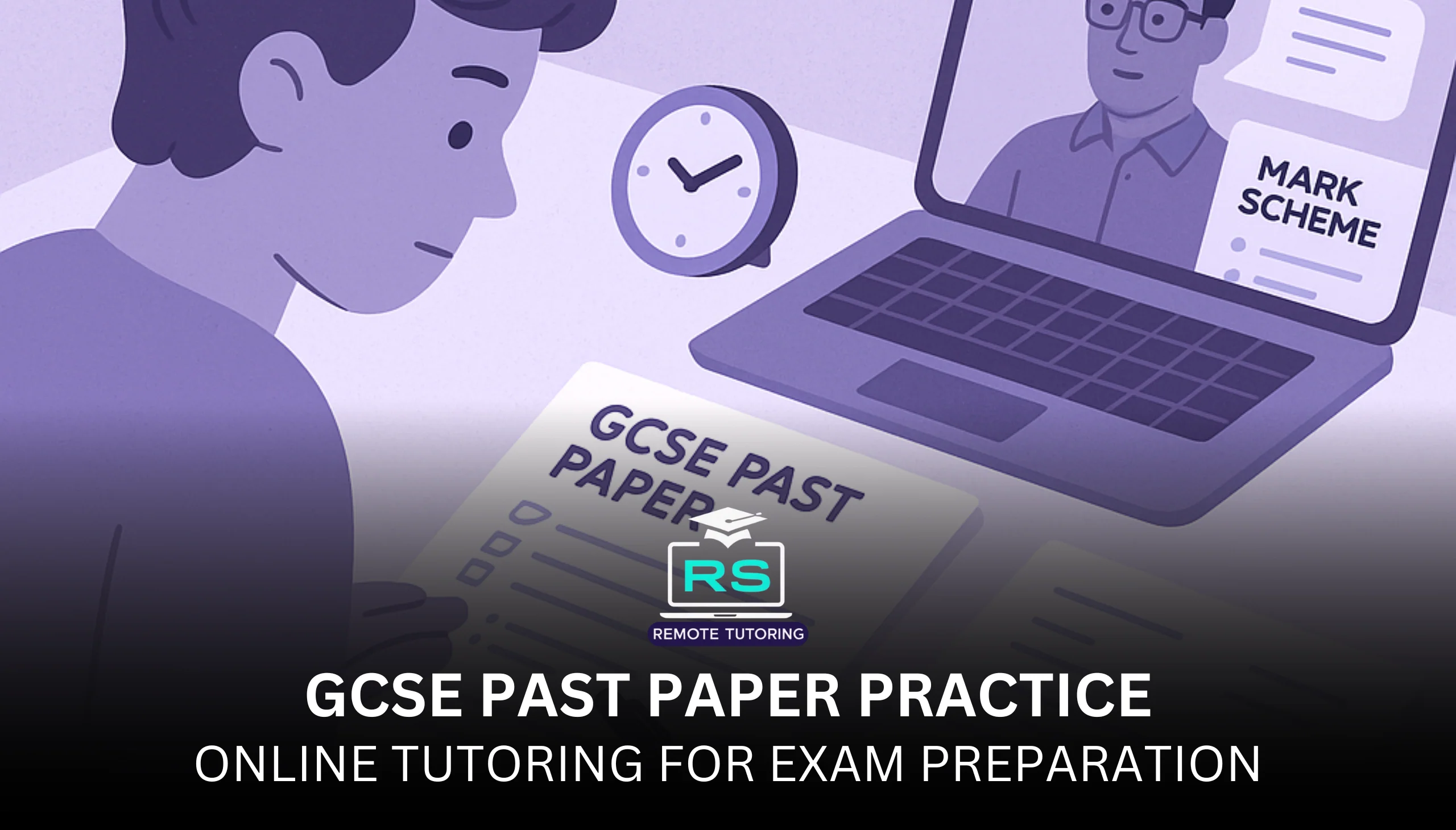
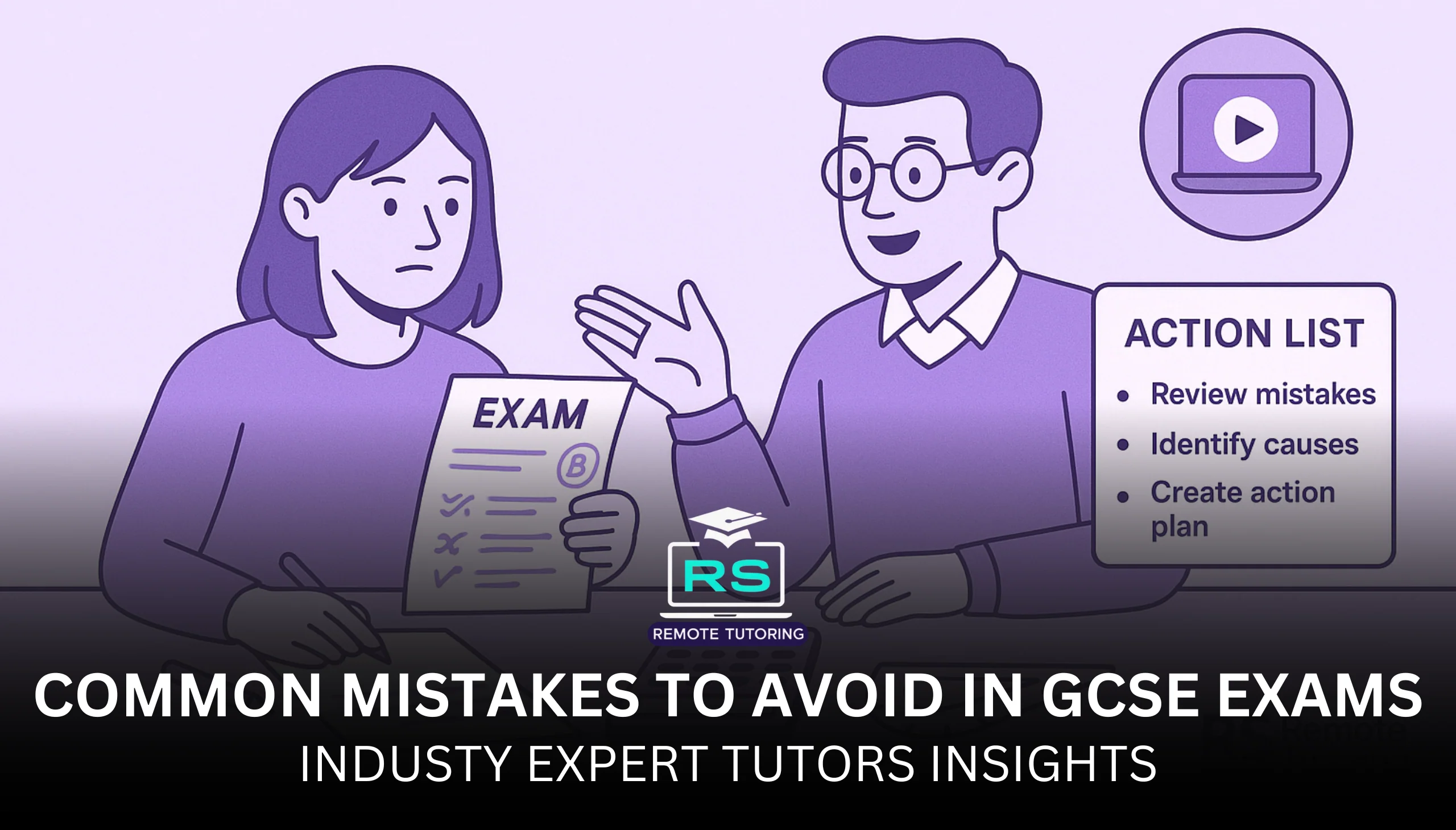

3 Comments
[…] GCSE resits. English Language and Mathematics resits are available in November for students who do not achieve a grade 4. Other subjects must be retaken the following summer. Resits provide a chance to improve grades but require commitment. […]
[…] assessments and a much broader curriculum review. It also tackles common questions such as “Is a GCSE resit mandatory?” and looks at alternatives being discussed, like replacing GCSEs […]
[…] GCSEs, there is no November resit window for A‑levels. Save My Exams points out that if you need to […]